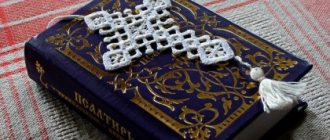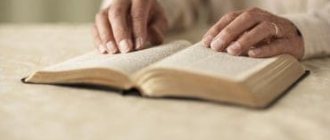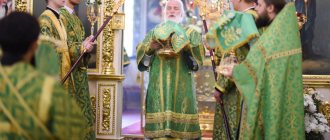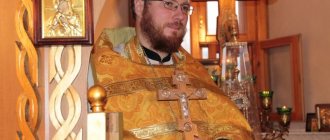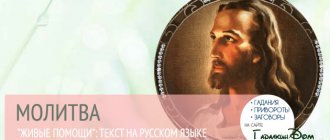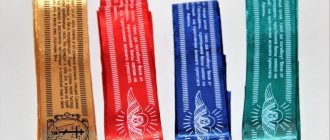Psalm 90 is read when life is in a difficult situation. Its other name is “He who lives with the help of the Almighty.” This text is found in the Psalter and is used in church services.
Solve your life problems. Change your destiny!
Ask the Universe for whatever you want: ⭐ Love ⭐ Money ⭐ Career ⭐ and more
To learn more
The meaning of Psalm 90
A psalm is an amateur song. Among Christians, it is as popular as the Lord's Prayer and the Hail Mary.
Christians believe that the psalm has miraculous powers. There is a version that Moses worked on its writing. However, most theologians believe that its author is King David. This prophet wrote a hymn of praise after he recovered from a serious illness.
The style of the text is similar to the instructions a teacher gives to his students. He tells them to trust God completely.
The main message of the song of praise is this. If one believes with all his heart and sincerely, such faith will help, with God's help, to defeat evil. David believed that the Almighty helps all believers. It protects against all dangers. The righteous man is under his protection, so that no trouble or danger frightens him.
Prayer is powerful. He was imbued with the thought of the irresistible power of the Lord.
As we study this text, it becomes clear that it contains a prophecy. For example, it contains indications that the Savior will come in the future and will be the main protector of every believer.
The “Living Helpers” prayer is distinguished by its poetic language.
The structure of the text is clear and can be divided into 3 parts:
- Verses 1-2 are included in the first section;
- the second consists of verses 3-13;
- The third is verses 14-16.
The hymn of praise is read not only by Christians, but also by followers of Judaism. The text of the prayer “Live for Help” in Russian is available in a separate publication.
Psalm 90
This psalm has the following inscription: Praise to the songs of David, not inscribed among the Jews.
And in the Psalter published by the Russian Bible Society, translated from the Hebrew language, it has the following inscription: “David’s Song of Praise,” to which the inscription of the Vulgate corresponds, i.e.
The Bible is in Latin, without adding words: not inscribed in Hebrew
, but simply: “laus cantici David XC”, i.e. "David's song of praise." All this indicates that in the ancient Jewish collection of psalms no inscription was placed over the 90th psalm, and that the short inscription that now exists: “David’s Song of Praise” was entered into the book of psalms later, for example, during the creation of the Greek translation of the LXX interpreters , and was introduced, of course, not spontaneously, but on the basis of the ancient traditions of the Old Testament Church that reached the wise publishers, who attributed the composition of this psalm to David.
In terms of its content, this psalm is laudatory (“Song of Praise of David”) and at the same time instructive: here the prophet teaches that man’s hope in God has irresistible power, and that therefore everyone who by faith and hope connects himself with God who helps him - becomes His friend and cohabitant and is in complete safety.
The peculiarity of this psalm is the rapid change of faces expressing their thoughts and feelings. Here either the prophet expresses his thoughts about the righteous man who lives in complete hope in God (vv. 1–2), or, turning to the righteous man, he reassures him with the blessings that are poured out on the one who trusts in God (vv. 3–8, 10–13) , or speaks on behalf of this righteous man, completely devoted to the will of God (vv. 2,9), or on behalf of God Himself, expressing His favor to the righteous man (vv. 14-16).
Some of the interpreters see in this psalm a general, abstract poetic image of a righteous man, in which all cases of deliverance are taken by the psalmist completely arbitrarily, without any historical relation, and who goes as much to David as to Hezekiah, and to any other righteous man. Others point out in him such features that almost all remarkably suit the face of the pious king of Judah Hezekiah and the circumstances of his time. Whoever is familiar with the history of this Hezekiah, it is absolutely clear that in the indicated image of the righteous man we have a poetic image of this story. In view of the clear similarity of the presented image of the righteous man with the story of Hezekiah, already Blessed. Theodoret, who generally attributed all the psalms to David, recognized Psalm 90 as a prophecy of David about Hezekiah.
Ps.90:1-2 He who lives in the help of the Most High will dwell in the shelter of the Heavenly God, says to the Lord: You are my protector and my refuge, my God, and I trust in Him.
The not entirely clear meaning of the sayings of verse 1, according to the Church Slavonic translation, becomes clear when reading other translations. So, translated from Hebrew it reads: “He who lives under the cover of the Most High (in the shelter of the Heavenly God) rests in the shadow of the Almighty”; and translated from Latin it reads like this: “Whoever lives with the help of the Most High (Allissimr) will abide in the protection of the Heavenly God. He will say to the Lord: You are my intercessor and my refuge: my God, I will trust in Him.” This expresses, on the one hand, the complete devotion to the will of God of a person who trusts in no one else but God, and on the other, the complete security of one who is in close communion with the Heavenly God, under His strong protection. In prayer he turns to God alone and boldly says to Him: You are my intercessor and You alone are my refuge.
;
and not only in prayer, but also before others, he confesses: He is my God and in Him I trust.
Ps.90:3-4 For He will deliver you from the snare of the trap and from the speech of rebellion: His lashes will cover you, and you will trust under His wing; His truth will surround you with weapons.
Here the prophet, turning his speech to the one most protected by God, says that the Lord God will deliver you from the net of the fowler (bird catcher or trapper, from the net of the fowler
) and from any hostile word that could lead you into confusion (
from rebellious speech
), in general from any slander and conspiracy against you.
He will cover you, will overshadow or protect you, as it were, with His shoulders ( His blanket will overshadow you
), and you will have hope that under His protection you will be safe (
and hope under His wing
).
In the first expression, the image of speech is borrowed from those warriors who, during battle, stand in the front ranks and cover those behind them with their shoulders, and in the second expression, the similarity is taken from birds who cover their chicks with their wings. Thus, the psalmist’s thought can be expressed this way: the almighty power of God will protect you, and, being under the protection of Divine care, you will be completely safe. The very truth
with weapons
on all sides .
By the truth of God
we must understand here the faithfulness of God to the promises: He promises His help to all those who trust in Him, and actually gives it. According to the translation from Hebrew, the last speech is expressed as follows: “His truth is a shield and a fence.”
Ps.90:5-6 Do not be afraid from the fear of the night, from the arrow that flies during the day, from the thing that passes in the darkness, from the debris and demon of the midday.
Many people are prone to fear at night
time, with threatening danger, and sometimes without any danger at all, with just the idea of danger, due to the surrounding darkness.
Some, in addition, brought up in various superstitions, experience some kind of unaccountable fear during so-called “meetings”. Although such superstitions about “meetings” are not universal and not acceptable to everyone, nevertheless they have always existed, one might say, from ancient times, and therefore they cannot be ignored. The psalmist, as if representing all such cases of fear
, calms a person under the protection of God, telling him: protected by the power of God, you will not be afraid of any dangers, neither obvious nor secret, neither day nor night, you will not have
nightly fear
, You will not be afraid of
an arrow flying during the day
.
You will get rid of every
(hostile)
thing
that happens at night (
passing in the darkness
), from a dangerous “meeting” and from every accident unexpected during “meetings” (
from the clot
, i.e. from everything that happens to us by accident) , and from the evil spirit that attacks
at noon
.
The name of the midday demon
refers to an evil spirit that, on a clear day or
at noon,
causes various types of harm to a person, such as pestilence and infection. Others, by the name of the midday demon, mean the heat of the sun, which burns intensely in Palestine and is deadly to travelers. And blzh. Jerome, in agreement with this, meant the pestilence, or deadly wind, known in the East, called Samum.
Ps.90:7-8 Thousands will fall from your country, and darkness will be at your right hand, but it will not come near you: behold your eyes and see the reward of sinners.
Dangers threaten people from all sides. On the one hand there are a thousand
, or as translated from Hebrew: “A thousand will fall near you, and darkness at your right hand” (
and darkness at your right
), i.e.
and thousands, and tens of thousands, and countless numbers of enemies will attack you, but they will not touch you (they will not come close to you
).
Or this: if a thousand enemies attack you on one side, and ten thousand or countless numbers on the other, then even then none of them will come close to you or destroy you. And you will not only not suffer any harm from the attacking wicked, but on the contrary, you will only look with your own eyes, and you yourself will see their reward from the Lord ( before your eyes, look and see the reward of sinners
). So it was with the pious king of Judah Hezekiah. When Sennacherib, the king of Assyria, attacked him with a large army and besieged Jerusalem, then Hezekiah prayerfully cried out to the Lord God, placing all his trust in Him. And the Lord soon delivered Hezekiah from the terrible danger that threatened him, defeating in one night the entire large (185 thousand) army of the Assyrians (2 Chronicles 32).
Ps.90:9 For You, O Lord, are my hope: You have made the Most High your refuge.
Trusting in God and always living in the help of the Most High
he says in himself with pleasure: You, Lord, are all my hope and support (
as you, Lord, are my hope),
and having said so, you have chosen (
thou hast chosen
)
as your refuge
, says the psalmist.
Ps.90:10-13 No evil will come to you, and no wound will come near your body: as His angel commanded you, keep you in all your ways. They will lift you up in their arms, but not when you dash your foot on a stone: you step on an asp and a basilisk and cross a lion and a serpent.
Here in verse 10, instead of the words: thy body
, - you need to read:
to your village
, as this place was corrected in the footnote in the new (since 1890) editions of the Bible and Psalms, according to the translation from the Hebrew, as well as the Greek and Vulgate (“village, dwelling”, Greek, lat. tabemaculuni), And again the prophet continues to speak about the Providence of God, which protects man who is completely devoted to Him, saying this: after you have chosen God as your refuge, no evil will come to you, and no blow will reach your home (village). ) yours (
and the wound will not come near your body
).
And then he indicates the direct, immediate reason for such salvation from disaster or threatening evil: God, in whom you have placed all your trust, will send His angels and command them ( His angels commandment about you
) to protect you in all your affairs (
keep you in all your ways
).
They, these angels, at the command of God, will take you, so to speak, into their arms and will support you, so as not to stumble with your foot on a stone ( not when you stumble your foot on a stone
), i.e.
so that you do not fall into temptation when you encounter any temptation on the path of moral life. In a word leg
, says St.
Athanasius of Alexandria, means “soul”, and the word stone
means “sin” [3, p.
304]. Verse 13, translated from the Hebrew, reads: “You will tread on the lion and the adder, you will trample the skimn and the dragon.” Asp, basilisk and dragon
, although unknown to us, are the most terrible snakes.
This is how they are described in the famous “Interpretation of the Psalms of Palladius, Bishop of Sarapul.” “The writer of everyday life calls the poison of the asp “incurable” (Deut. 32:33); due to his ferocity, he resists all “spells” (Ps. 57: 5-6); The basilisk
is no less terrible : its fiery eyes have a dangerous effect on animals;
its poison is fatal, and an animal stung by it dies soon; Due to its invincible power and, as it were, the power of life and death over other animals, the basilisk
in ancient times was a symbol of terrible, royal power.
The dragon
(boa constrictor, or boa) is the largest of all serpents, up to 30 or 40 feet long (about 12 m -
Ed
.), swallows people, bulls and oxen;
due to his terrible power, he portrays himself as the “devil” (Apoc. 12: 3–4). The strength of the lion ( skimna
) is known.”
The sayings of this verse, like the previous ones, express the idea that, being protected by angels, you will repel the attacks of the most terrible enemies: you will safely, harmlessly step on the asp and the basilisk
, you will
trample
(overcome)
the lion and the dragon
. These animals, as the most terrible, serve as an image of imminent danger or worst enemies. Here the idea is figuratively expressed that for a person protected by angels, nothing at all, even the most terrible, can be dangerous.
Ps.90:14-16 For I have trusted, and I will deliver, and I will cover, and because I have known My name. He will call to Me, and I will hear him: I am with him in sorrow, I will overcome him and glorify him: I will fill him with long days and show him My salvation.
After reassuring the righteous man with comforting words about the angels sent by God to protect him from various troubles and misfortunes, the prophet introduces God Himself speaking about the righteous man in the following expressions: since he trusted in Me (for he trusted in Me )
), then I will deliver him and hide him from danger.
And because he knew and believed in Me ( for he knew My name
), i.e.
He served and worshiped me alone, not recognizing other gods. I will always help him and listen to his prayer ( I will hear him
).
If any sorrow befalls him, then I will be with him in sorrow ( I am with him in sorrow
), I will deliver him (
I will remove him
) from all sorrowful and difficult circumstances, and not only will I deliver him, but I will also
glorify him
, i.e. .
and I will direct the most unfortunate circumstances to his prosperity and glory. I will do for him what I once did for the long-suffering righteous Job, or what I did for the pious king of Judah Hezekiah. By the length of the days I will fulfill it
, i.e. he will receive a long life on earth and will be honored with the eternally blissful life of the next century.
When to say a prayer
Reading prayers or saying them mentally is work for the soul. There is an expression “man does not live by bread alone.” People should not only feed and work for the benefit of society, but also develop the spirit. We must keep the Lord's commandments.
Believers follow the standard that is Christ. The Psalms help with this. The importance of prayer is enormous. Theophan the Recluse explained the importance of reading. He believed that the text should be remembered.
When believers read the Psalms, they understand the words spoken by the author. Over time, they begin to understand new nuances of his thoughts. And then prayer becomes not a difficult lesson that needs to be “survived,” but an urgent necessity.
Many people wonder whether Psalm 90 should be read in Russian or Church Slavonic. It can be read in both directions. They say that a person is afraid for himself, his family or another person close to him. If he learns this verse, he can recite it at any time. This will help him calm down and get rid of anxiety.
The song helps when people feel an attack of pride or anger. Luke in the Gospel says that this allows us to get rid of temptation.
By reading this text, believers feel a connection with God. They ask for his protection, love and protection.
Money amulet “Venetian magnet”
The personal patron of prosperity and wealth has already helped thousands of people get rich: ⭐ 98% of the owners have improved their financial well-being.
⭐ 3543 owners of the amulet opened their own business. ⭐ More than 5,000 people bought luxury homes or cars. To learn more
This is a powerful prayer that helps in the following situations:
- in situations of fear;
- attacked by enemies and other dangers;
- against incurable diseases;
- against slander;
- against the malice and slander of those who envy you;
- life threatening.
People wonder what Psalm 90 helps with. It is read for all kinds of evil and trouble. Priests recommend first reading a prayer dedicated to the Blessed Virgin Mary, and then picking up the Psalter.
It is helpful to read hymn of praise No. 26, then go to No. 50 and finally to No. 90. This order is called “salvation prayers.” They help in combat operations in difficult life circumstances.
The Psalms are read when a person is worried about the future, is in fear, or is dissatisfied with himself. These texts are rejected when there are doubts about one’s own abilities or concerns about earning money.
Prayer helps you feel more confident. A person experiences happiness and self-confidence in life.
This hymn is recited during afternoon and evening Orthodox services. It is also played during memorial services and funerals.
The meaning and power of the prayer “Alive in Help”
In its style, the text resembles the instructions of a teacher to his followers. The author seems to be addressing the disciples, urging them to completely trust the Lord God. The main idea of Psalm 90 is that true, unshakable faith can overcome any evil. The song says that the Almighty will help and save all who sincerely believe in Him. A truly righteous person is not afraid of any danger if he is under the protection of the Creator.
The prayer “Alive in Help” helps:
- to escape from misfortunes, disasters or diseases;
- to be consoled in grief;
- to guide those who have turned away from it onto the righteous path;
- strengthen faith;
- uplift the spirit;
- enlist the support of the Creator.
Psalm 90 is revered not only by Orthodox Christians, but also by representatives of other religions, for example, Judaism.
Strengthening faith in the Lord God
Creator Support
Prayer helps to console oneself in grief
Prayer Song Rules
Psalm 90 requires constant work to produce results. The believer must work in prayer. It is better to memorize the text and then read it when it becomes alarming.
Theophan the Hermit advised reading hymns of praise at any time. Often we need God's living help.
You can also sing songs of praise at home.
To work, they must meet the following conditions:
- This person must be baptized, wearing a cross is mandatory.
- The Psalms are to be used by the sanctified in the church.
- Before reading, you need to calm down. You can atone for bad deeds mentally.
- It is advisable to ask the priest for a blessing to read the psalm. If there is no desire or opportunity, you can say: “God bless you.” You can also call your guardian angel.
- Standing in front of the icon of Jesus Christ, it is useful to read a hymn of praise.
- It is better to recite this text in silence so that the family is not disturbed during prayer.
- Parishioners light church candles.
- When reading this prayer, you need to put your soul into the words, opening your heart to communicate with the Lord. It is useful to fill phrases with love for God. The Almighty hears not only the words that a person utters, but also looks at his feelings and emotions.
Prayer is difficult, but over time such an appeal to God will become a necessity. This means that someone has made progress on the spiritual path.
Psalm 90 is read in the morning, when nature is just waking up. But there are times when protection is needed urgently, then it is repeated everywhere.
The hymn of praise is appropriate to ask for protection not only for oneself, but also for relatives and children. For this purpose, this text is pronounced for 40 days, in each of them they pray 40 times. When a prayer is said, desires are conveyed to the Lord with a request for help.
What not to do when reading
Formally, the text does not help. If one does not feel that all people stand before God, he will not receive an answer from Him. There will be no help if a person is driven by selfish interests and wants to make profit from others. The little ones won't get anything.
Praise is not a medicine, but a way to work in the spiritual realm. A person must direct his energy to his own development.
Appropriate place
Psalm 90 in Russian is said at home in the privacy of your own room. But you can tell yourself this as you go to work. A person living in a metropolis can mentally pronounce these words.
